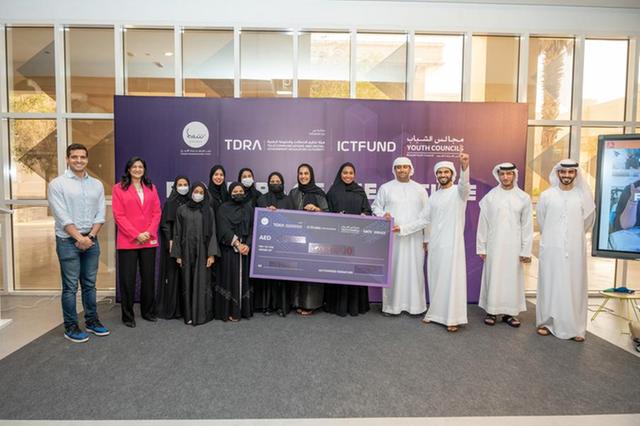Three multidisciplinary teams of young changemakers, comprising mostly of Emirati students and youth, have been named winners of a three-day hackathon organised by the Sharjah Entrepreneurship Center (Sheraa) and the UAE’s Telecommunications and Digital Government Regulatory Authority (TDRA), in partnership with the Sharjah Youth Council.
The ‘Pioneers of the Future’ hackathon, which received over 500 applications, has recognised three top teams for their next-generation solutions that are leveraging emerging technologies to help achieve vital sustainable development goals. The teams ideated, prototyped, and tested their solutions to address human needs in the modern age.
Held from June 3 – 5, the hackathon winners were selected from a group of 10 teams, each with 10 members who came up with innovative solutions to address everyday challenges for the UAE market. While the first prize went to Targo, the second and third places were taken by Revo IoT and Suppliaza in a closely contested pitching competition on the final day of the hackathon.
Targo’s winning project was an Augmented Reality and Artificial Intelligence-supported website that allows small businesses to obtain, purchase, and clear international cargo space while choosing the most optimum route.
Revo IoT aims at integrating post-image recognition – through scanning incoming stocks via digital cameras – while AI helps predict demand of goods. The system is connected via IoT (Internet of Things).
Suppliaza is an application that aims to utilise AI and machine learning (ML) to bridge the gap within the business-to-business (B2B) food supply chain while being responsible and sustainable.
All the winning projects are geared towards integrating sustainability practices across value chains to ensure a resilient and greener future for all. The total prize pool of AED 50,000 will help support the top teams take their winning ideas to the validation stage and accelerate the process of building the product.
Elaborating on Sheraa’s commitment to mentoring and empowering a new generation of changemakers, Najla Al Midfa, CEO of Sheraa, noted: “By finding novel solutions to critical issues, the winners of the ‘Pioneers of the Future’ hackathon reflect the entrepreneurial potential of the nation’s youth in emerging as disruptive, fearless, and empathetic young leaders of tomorrow. Together with ICT Fund and Sharjah Youth Council, Sheraa is committed to investing in our country’s talents, and bringing students and youth together to co-design tech-enabled innovative solutions that will help build future-proof economies.”
The Sheraa CEO added: “The hackathon was an exciting way for young, entrepreneurial Emiratis to develop creative solutions through a unique human-centred approach. Sheraa is optimistic that some of the world’s biggest ideas will come from this region, and we look forward to facilitating our young generation in developing and designing practical and better products, services, and processes to improve lives for communities everywhere.”
Eng. Omar Al Mahmoud, CEO, ICT Fund, said: “The outstanding winning ideas of ‘Pioneers of the Future’ hackathon – a project that stems from the cooperation between ICT Fund and Sheraa, demonstrate the young generation’s abilities to analyse current reality, identify problems, absorb latest scientific findings and leverage them to develop innovative and sustainable solutions to better our society in various fields. ICT Fund is keen to support all initiatives and projects that develop young people’s competencies and empower and enhance their digital skills to help fulfil the country’s vision of growth and the global sustainable development goals.”
Al Mahmoud stressed the importance of such events in stimulating the spirit of innovation and creativity among youth. He added: “Our youth have boundless creative energies, and it is our responsibility to motivate and direct them to serve the interests of the UAE community. We will strengthen our cooperation and partnership with Sheraa to activate more initiatives and projects that enhance our investment in youth, who are the real wealth of our country.”
Engineer Fahad Alzarooni, CEO of Xdrone and a member of the Sharjah Youth Council, observed: “The ‘Pioneers of the Future’ hackathon aligns with the UAE’s strategy of building a new generation of young entrepreneurs. The focus on creative thinking in entrepreneurship has also strengthened the spirit of competition amongst participants.”
Three-day Hackathon Journey
The ‘Pioneers of the Future’ hackathon employed a three-pronged approach for product development and design – Inspiration, Ideation, and Implementation. Participants undertook a day-long onboarding session before embarking on a journey of teambuilding and ideation that introduced participants to new ways of understanding and learning to tackle a challenge creatively, especially from a design thinking perspective.
All teams gained insights and applied hands-on methods to find innovative answers via the five stages of the design thinking process. From learning strategies to develop an empathetic understanding and identifying the needs of the target users to thinking creatively to come up with innovative solutions, draw up draft prototypes of ideas, and test out the solutions to validating their product/service, all participants took a deep dive into design thinking over the three-day hackathon.
The exciting learning journey culminated with a one-hour pitching event where each team had 3 minutes to pitch their solution and 2 minutes for a Q&A interaction with the jury panel comprising Sheraa members Deenah Al Hashemi, founder of Sxill and Omar bin Brek, founder of Foloosi; ICT Fund member Aisha AlFalasi, and Director of Partnerships at Sheraa, Lina Hamdan.
The goal of the hackathon was to reach out to youth and university students and equip them with design thinking strategies in their journey as startup entrepreneurs. The 100 participants were selected from over 500 applicants and were divided into 10 teams. They received expert-led training for three days.

